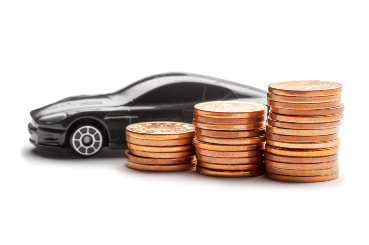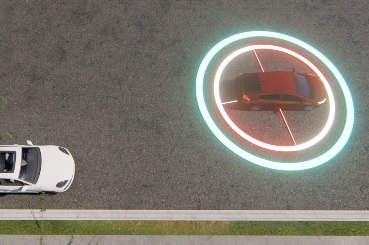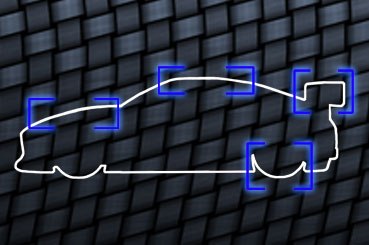Hydrogen is an alternative fuel source that is currently being investigated by numerous car manufacturers. There are only currently 2 commercially available hydrogen cars on the market, the Hyundai ix35 and the Toyota Mirai; however, many other manufacturers are now considering hydrogens potential to offer a viable alternative fuel source.
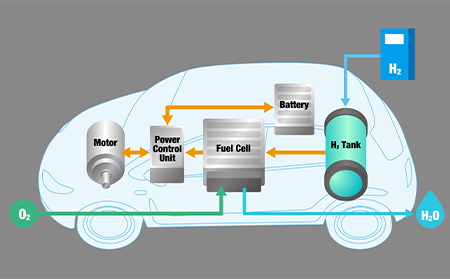
How Do Hydrogen Cars Work?
Hydrogen Storage:
Compressed hydrogen gas is stored in tanks within the car. These tanks are typically made from carbon fibre to be lightweight and strong.
Fuel Cell:
- Hydrogen from the tank is fed into a fuel cell.
- Inside the fuel cell, hydrogen reacts with oxygen from the air in a chemical process.
- This process produces electricity, water (which is emitted as vapour), and heat.
Electric Motor:
- The electricity generated by the fuel cell powers an electric motor.
- The electric motor drives the car’s wheels.
Battery:
- Many hydrogen cars also have a battery.
- The battery can store extra electricity from the fuel cell for later use, or it can provide power to the motor when needed.
- This helps with acceleration and power delivery.
Refuelling:
- Refuelling a hydrogen car is similar to refuelling a petrol or diesel car.
- Hydrogen is dispensed into the car’s tanks at a filling station.
- Refuelling time is typically shorter than charging an electric car.
Zero Emissions:
- The only emission from a hydrogen car is water vapour.
- This makes them a potentially cleaner alternative to traditional petrol or diesel cars.
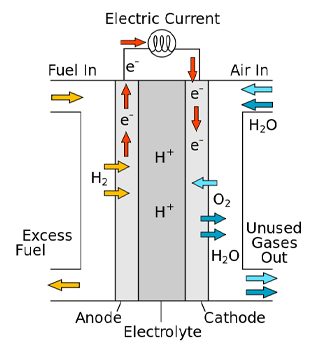
How Do Hydrogen Fuel Cells Work?
A fuel cell has positive (anode) and negative (cathode) terminals between an electrolyte (usually a Proton Exchange Membrane, PEM)
Hydrogen is fed to the anode where there is a catalyst. The catalyst divides the hydrogen into protons and electrons
The positively charged hydrogen protons and electrons are attracted to the negatively charged cathode but must pass through the PEM to reach the cathode
The electrons are unable to pass through the PEM and are forced to make their way around the cathode, via an external circuit, which creates an electric current. This current drives the car or can charge an onboard battery
When both hydrogen protons and electrons reach the cathode they re-combine with oxygen which is fed in from the air outside and produces water. This water is expelled through the exhaust as water vapour
From a user perspective, you simply need to fill up with hydrogen much like you would fill up a conventional fuelled vehicle.
Why are Hydrogen Fuel Cell Cars Not as Common as Hybrid or Electric Vehicles?
One of the biggest factors for a lack of popularity for hydrogen fuel cell cars is cost and lack of infrastructure.
The cost of hydrogen vehicles is currently much higher than that of similarly sized electric or hybrid vehicles. Manufacturers are looking at ways to reduce the cost of producing hydrogen fuel cell vehicles to reduce consumer costs. However, it’s a bit of a chicken and an egg situation, as whilst there is little demand productivity remains low and prices high.
Refuelling is another big problem as there is currently little infrastructure within the UK to support hydrogen fuel. To achieve the infrastructure required to support hydrogen refuelling a vast investment is required. In addition, refuelling a hydrogen vehicle is currently more expensive than charging an electric vehicle or re-fuelling a conventional engine with petrol or diesel.
Will Hydrogen Fuel Cars End the Electric Market?
While hydrogen fuel cars offer an intriguing zero-emission alternative, it’s unlikely they will completely eclipse the electric vehicle market.
The rapid advancements and economies of scale in battery technology have given electric cars a significant head start. Additionally, the existing charging infrastructure and the broader electric power grid are more established than the hydrogen fuel network.
That said, hydrogen could carve out a niche for specific applications, such as heavy-duty transport or long-distance travel, where battery range might be a limitation. Ultimately, a mix of electric and hydrogen vehicles, alongside other sustainable options, is likely to shape the future of clean transportation.
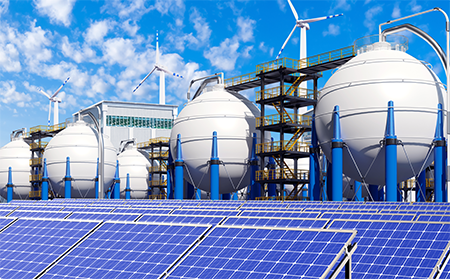
How Do I Charge a Hydrogen Car?
Unlike electric cars, hydrogen cars don’t require charging.
Instead of plugging in, you refuel them with hydrogen gas. This process is remarkably similar to filling up a petrol or diesel car, and it takes about the same amount of time – typically just a few minutes. So, if you own a hydrogen car, you’ll visit a hydrogen refuelling station rather than a charging point.
Are Hydrogen Fuel Cars Better for the Environment?
In terms of tailpipe emissions, hydrogen cars are better for the environment than conventionally fuelled vehicles, as the only emission from the exhaust is water vapour.
Currently, a lot of hydrogen is generated from fossil fuels, so there is an environmental cost to this. However, even extracting hydrogen from natural gas is better than the fumes produced from a conventional engine.
Many people believe that hydrogen fuel cell cars are less efficient than battery electric vehicles. This is because electricity is required to produce the hydrogen and to transport hydrogen it must be put under high pressure to turn it into a liquid (which again requires electric input). So in effect, more steps are needed to produce electricity from hydrogen than directly via electricity.
Are Hydrogen Cell Fuelled Cars The Future?
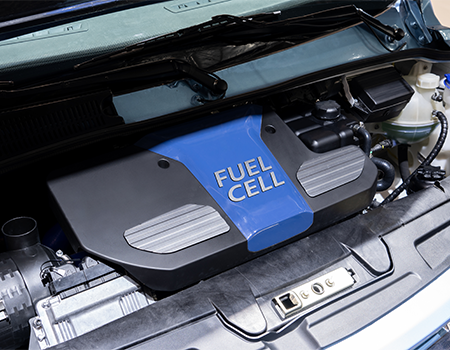
At the moment, electric vehicles (EVs) have a maximum range of around 300 miles, but for this, you’d be looking at top-of-the-range models from the likes of Tesla which come at a substantial cost. For most EVs, a range of around 150 miles is the most currently achievable, whereas fuel cell cars are capable of a range three times greater than this.
What’s more, hydrogen fuel cell cars can be refuelled in the same way as petrol or diesel engines, which means they could provide a viable alternative fuel for long journeys. So for trucks, long-distance drivers, buses and taxis, hydrogen fuel cell cars could be the answer.
Furthermore, the hydrogen required to produce electricity can be generated in a more renewable way by the electrolysis of water. This process separates water into its component parts – oxygen and hydrogen. The main benefit is that the earth is made up of 70% water so there is plenty to access.
The cost of hydrogen will come down as more and more people start to use the fuel type. Manufacturers are also trying to come up with new approaches to car ownership, so options like leasing a hydrogen fuel cell car with fuel costs built-in may become an option.
Whatever happens, with the government planning to ban the sale of conventionally fuelled vehicles by 2040, it’s clear we need to continue to look at alternative fuel sources. If you’re not convinced about hydrogen fuel cell cars, why not discover more about hybrid vehicles or electric vehicles.







